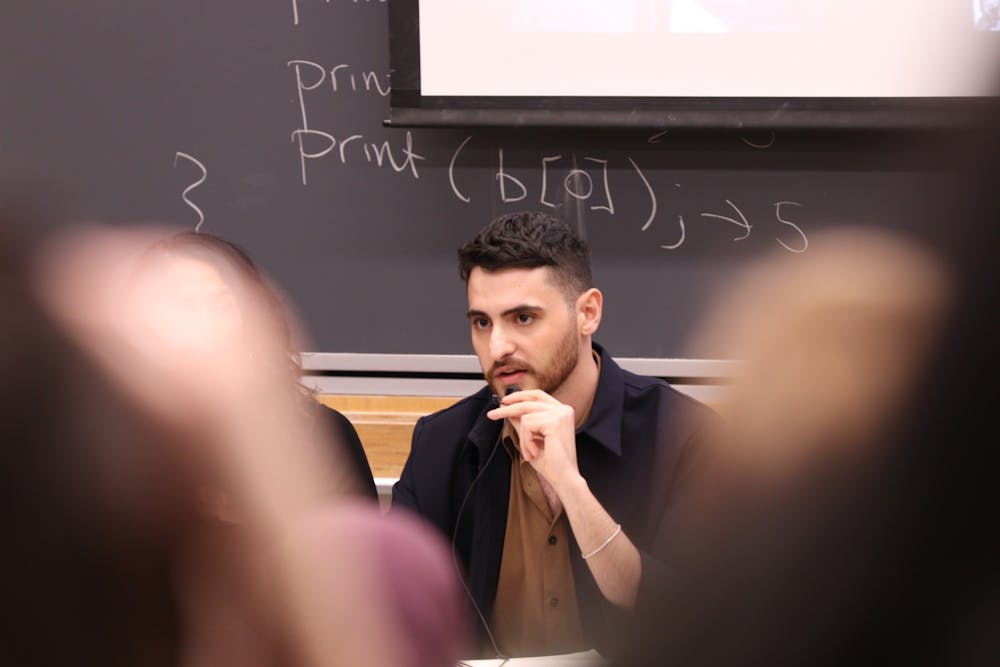Penn Against The Occupation hosted a speaker event on March 23 featuring writers and critics of Israel's occupation of Palestine.
The group invited Rutgers University professor Noura Erakat and Palestinian writer Mohammed El-Kurd to speak as a part of Israeli Apartheid Week, a series of lectures at universities held across the country each year. Over 250 people attended the event.
Erakat and El-Kurd are prominent Palestinian activists. El-Kurd was named to Time Magazine’s 2021 list of the world’s 100 most-influential people and is an outspoken critic of Israel’s occupation of Palestine and has drawn criticism for controversial comments he has made in the past, which some groups have called antisemitism.
Before the event, student groups including Penn Israel Public Affairs Committee and Students Supporting Israel published a statement opposing El-Kurd’s visit to Penn and calling on the administration to condemn the event and El Kurd's comments.
University spokesperson Ron Ozio did not respond to a request for comment.
In anticipation of student protestors, extra security was in place at the event. No major protests or disruptions occurred, in contrast to events at other universities that El-Kurd has spoken at.
At the event, Erakat spoke about Israel's far-right government, Palestinian resistance, and the role of the United States in the Israel-Palestine conflict. She also spoke about her time at the University of California at Berkeley, where she was part of a student group that called upon the university to divest against apartheid.

RELATED:
More than 300 students, faculty, alumni sign statement urging Penn to divest from Israel
Students for Justice in Palestine holds 'Israel Apartheid Week'
El-Kurd, who grew up in East Jerusalem, spoke about his childhood in Palestine and the current displacement of thousands of Palestinians by the Israeli government. Since the start of this year, over 100 Palestinians have been injured in the conflict, according to United Nations Office for the Coordination of Humanitarian Affairs.
“We are told that they can demolish our homes — our neighborhoods — they can dispossess countless of us,” El-Kurd, who was displaced from his home as a child, said.
El-Kurd said that the international community was more interested in maintaining the narrative that the Israeli government takes its actions "for security reasons only," and does not factor in the "systemic and institutional violence on the ground" against Palestinians.
The goal of Israeli Apartheid Week is to “bring attention to the ongoing settler colonialism and ethnic cleansing of an entire people, provide visibility to Palestinian voices, and the oppression that they have been facing for the past 75 years,” a student organizer from Penn Against the Occupation, who requested anonymity out of fear of retribution, said.
The statement released by Jewish student leaders on campus referred to some of El-Kurd’s past tweets, which they said expressed antisemitism rhetoric. The statement specifically cited a line from a published poem in which El-Kurd claimed Zionists were “harvesting Palestinian organs,” and another tweet in which he compared the actions of Israel to that of Nazi Germany.
“This antisemitic rhetoric does not belong on campus or our community,” the statement said.
During Thursday’s event, El-Kurd acknowledged his controversial statements and alleged that some have been taken out of context, acknowledging that Israel admitted to harvesting organs from dead bodies — without consent — in the 1990s.
In a statement posted online hours before the event, Penn Chavurah, a progressive Jewish student group, said it disagreed with the message by PIPAC and SSI that was reposted by Penn Hillel and other groups.
“We do not unilaterally endorse everything El-Kurd has said, tweeted, or published,” Penn Chavurah’s statement said. “But we believe he is being put under an unreasonable amount of scrutiny because of his bold and effective Palestinian advocacy.”
A member of Penn Chavurah, who requested anonymity out of fear of retribution, said that the group wanted to contest the narrative that they saw circulating across campus.
“We want to make it really clear that the Jewish community is not united," the student said.
College sophomore Sarah Bender said that there needs to be an established threshold to assess the danger of a speaker because when speakers spread hate or vilify Jewish people it makes students feel unsafe.
“I think there’s a difference in being critical, which even I can be at times, versus veering into antisemitism," Bender said.
College sophomore and Penn Hillel co-president Eitan Weinstein said he attended the event because it was important to hear what other people have to say, even if "there's going to be things that are said that are uncomfortable to me."
"It is important to be sitting in some of the discomfort, but it's also important to be able to draw a line and say, 'Okay, some of these comments that you're making that are inflammatory, are unproductive, and absolutely harmful," Weinstein said.
Palestinian students, including College senior Sylvie Tuder, said that Penn can often feel “hostile to the Palestinian perspective, and to Palestinian sovereignty.” Tuder praised Erakat and El-Kurd for speaking to those who do not know as much about the conflict, as well as Palestinians who have experienced it themselves and grown frustrated.
At the event, El-Kurd emphasized the importance of humanizing Palestinians and the Palestinian experience.
“We are at a moment in time in which there is openness, if not eagerness, to stand with Palestinians, listen to Palestinian advocacy, and try to understand the seemingly so-called complicated, ancient conflict," he said.









